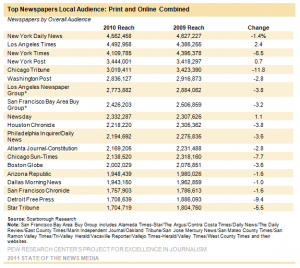For any PR pro who has jumped on the bandwagon and thinks that newspapers no longer matter, I urge you to read a great report just out from the Poynter Institute. The report sought to measure the total online and print reach of newspapers in their local markets, and the results may surprise you.
First: newspapers still reach a massive audience. The combined local market reach (online and print) of the top-20 newspapers is 47,370,687. That’s 15 percent of the U.S.’ 307 million population. (Note: The Wall Street Journal and USA Today were excluded because their local market isn’t clearly defined.)

I don’t know about you, but if I’m able to tap into even a sliver of that size of an audience, I’m absolutely going to give newspapers a bit more of my attention going forward.
Perhaps most surprising, however, Continue reading

